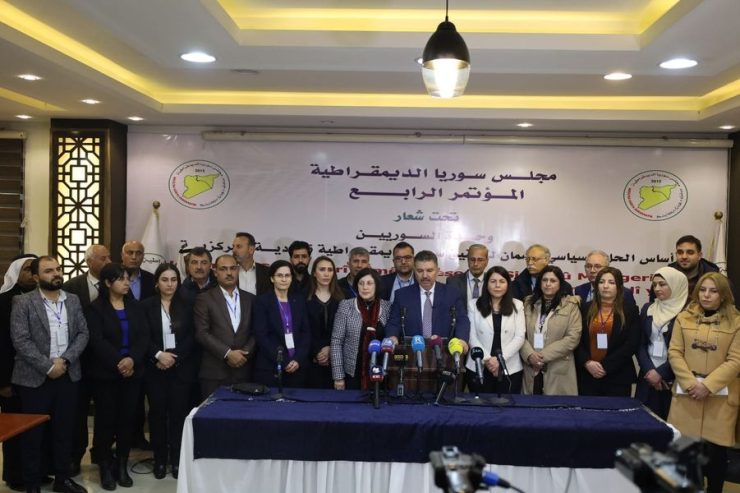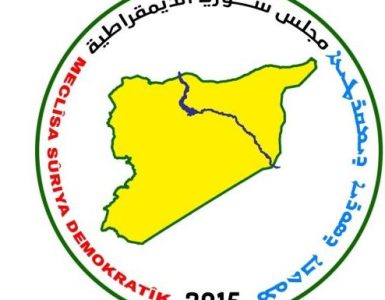The Syrian Democratic Council (SDC) held its fourth annual conference on December 20, 2023, in the liberated city of Raqqa from the terrorist group (ISIS). The conference witnessed the participation of 300 members representing political parties, social activities, women’s organizations, civil entities, the Democratic Autonomous Administration of Region of North and East Syria, as well as representatives from the Syrian Democratic Forces (SDF).
The conference opening was attended by a significant number of representatives from Syrian political powers and parties, and numerous speeches were delivered both in person and through live broadcast. The conference received many messages on this occasion.
Our conference was held at a time when the region and the world are witnessing events of great importance that will undoubtedly have a profound impact on the international political scene. The Ukrainian crisis and the recent Gaza crisis represent the global system’s crisis and the conflict among its political poles. This further complicates the challenges facing Syrian powers in their relationships with the international community and their response to emerging developments. The deepening involvement of some Syrians in regional crises while Syria suffers from fragmentation and division exacerbated by direct regional interventions in the Syrian crisis, either by creating proxies on the ground or through the direct occupation of parts of Syria.
We have decided to hold the Conference at this time to refocus the attention on the crisis facing the Syrian people for the past thirteen years. Syria continues to suffer from complex political, social, and economic crises that have disastrously impacted citizens’ lives, leaving them hopeless about the restore of stability to their homeland. The country has witnessed an unprecedented destruction, cases of killing, displacement, and mass migration.
Policies of the authoritarian regime still remain a fundamental cause of the Syrian crisis, as evidenced by the recent uprising of the people in Suwayda Governorate, expressing their discontent with the oppressive central regime of the Syrian government. Additionally, the regime, instigated by Turkish influences, has recently sought to create a significant strife in the Deir ez-Zor region, aiming to destabilize northeastern Syria and undermine the crucial role of the SDF in maintaining security, stability, and defeating the ISIS.
Our conference is held at a time when the primary and most dangerous challenge facing Syrians is the threat of the resurgence of terrorist extremist groups. These groups have gained strength in recent years, proclaiming their so-called state on the ground and imposing their extremist ideology. They have engaged in the most severe forms of abuse against humanity. These groups have received various forms of support by regional powers aiming to fragment Syrian society, weaken people’s will, and hinder their aspirations for a democratic transition. Achieving such transition would address numerous democratic issues in the region.
The Syrian crisis has proven to be a structural crisis related to an exclusionary mindset that rejects the concept of participation in society, politics, and the economy. The regime, both as a political expression and governing approach, represents one of the key reasons of this crisis and a major cause. Additionally, many powers opposing the regime have embodied another form of the crisis, displaying an exclusionary behavior influenced by external agendas based on ideological and opportunistic thoughts at the expense of Syrians.
The recent developments in the region, particularly those related to the global conflict crisis and its manifestations, have demonstrated that all attempts to avoid a genuine political resolution and resort to external support have yielded no positive results for Syria. The failure of Syrians to agree on a satisfactory formula to end the crisis and address its consequences, restoring Syria to its recovery, has rendered the country incapable of playing any role at the national, regional, and international levels.
The conference emphasized the importance of concerting efforts to revitalize the intra-Syrian dialogue, aiming to come up with national agreements that strengthen the unity of the Syrian spectrums committed to the democratic national project. It also highlighted the commitment of the SDC to the Syrian national discourse, addressing all national issues at the same level. The Council is dedicated to adopting unified positions for Syrians, embracing democracy, human rights, and the unity and freedom of the Syrian people. The conference urged its members to exert all the best to achieve the Council’s goals on the national level, considering it as the most significant Syrian project with a national mission that represents the reality of cultural, national, and religious diversity, embodying values of tolerance and coexistence.
The conference emphasized the importance of Arab countries and their role in the region. It expressed the openness to any contribution aimed at restoring the Arab role in Syria, supporting the Syrians’ will in the democratic transition, and reclaiming a vital role in ensuring regional security and stability.
The conference highlighted the significance of communication and coordination with various international powers, including the United Nations, the United Nations Security Council, the European Union, the Arab League, and the Gulf Cooperation Council. It urged collaboration to improve the humanitarian situation for Syrians, enhance support and relief plans, particularly focusing on improving Syrians’ conditions in camps inside Syria and abroad.
Furthermore, the conference affirmed the UN’s role in consolidating the foundations for the political resolution. There was a consensus on the need to coordinate with international powers to clarify the objectives of the SDC project. The international community was urged to exert more efforts to achieve a consensus on a political resolution that represents the aspirations of all Syrians without an exclusion.
The conference also reiterated its commitment to restoring Syria’s complete sovereignty over its territory. Syria is acknowledged as a state committed to good neighborly relations, urging Syrians to work together according to a national plan to end all occupations of Syrian territories. The conference rejected any attempts to impose demographic changes, displace indigenous populations, seize their lands and properties under any pretext.
Additionally, the conference condemned demographic changes carried out by the Turkish occupation army in northern Syria, in collaboration with Syrian extremist factions affiliated with it.
The conference emphasized the need to concert efforts of all Syrian powers, leveraging demographic diversity as a focal point to gain regional and international support. It highlighted addressing of the issue of any Syrian component as a national issue, considering the privacy of each component, and seeking harmony based on intellectual, national, and religious aspects in favor of national interests of all Syrians as well as supporting of the Syrian national project overseen by the SDC.
The conference recognized the right of any Syrian power to hold political, cultural, or training agreements in the context of exchanging experiences with non-Syrian powers. However, it emphasized that no party has the right to hold treaties with countries concerning Syrian national interests and properties, as this prerogative belongs to elected powers represented by the new legitimate government formed based on democratic principles and rules.
Also, the conference affirmed that the Kurdish issue is a national affair par excellence matter that must be resolved justly within the framework of international covenants and treaties, as outlined in the new Syrian constitution. It is as a start to addressing various issues of other national components in Syria. Additionally, the conference highlighted the Syriac-Assyrian component as an authentic Syrian component, insisting that the Syrian constitution should recognize and ensure its rights.
Furthermore, the conference stressed the importance of cooperation and support civil society to fulfill its genuine and effective role. This includes developing relationships that are in favor of Syrian national interests, conducting projects that support national issues, establishing a form of engagement with local civil society, cultural institutions, and correcting concepts and facing challenges as well as organizing international and regional conferences and workshops to explain the SDC project and discussing its principles and objectives.
The conference also affirmed its support for political movements across the entire Syrian territories, assisting emerging parties in exchanging organizational and political experiences. It emphasized the support of women’s and youth work, advocating for the establishment of women’s and youth associations, and organizing conferences for each at the Syrian level.
The conference also highlighted the importance of the clans’ role in shaping Syrian society. It addressed the unstable legal, constitutional, and political situations created by the crisis, negatively impacting the clans’ situation because various intervening powers sought to exploit their role. The conference welcomed the idea of holding a conference for clans to rectify their course and enhance their role in supporting the national agenda.
It affirmed the importance of continuing an active participation in preparations for holding a conference for democratic powers and figures. The aim is to establish an effective and balanced political front capable of achieving the aspirations of Syrians and working to enhance stability and security in the North and East of Syria as a focal point to attract and unify Syrian national efforts.
Efforts will focus on building capacities and strengthening the role of the SDC representatives abroad, providing them with the necessary competencies for developing communication and dialogue with various political entities abroad.
The conference also approved its new Internal System and political document, along with adopting a roadmap to resolve the Syrian crisis. Several organizational decisions were made, including the acceptance of ten powers, parties, and figures. Additionally, structural adjustments were made to increase flexibility in work, aiming to elevate the performance of the council in the upcoming phase.
The conference acknowledged the efforts of the former Co-chairs of the Council, represented by Mr. Riyad Darar and Mrs. Amina Omar. It also appreciated the efforts of Mrs. Ilham Ahmad, Chairwoman of the Executive Body, and the members of the body who exerted significant efforts for interests of the Council nationally by promoting a culture of dialogue among Syrians and enhancing the diplomatic relations. Despite attempts to impose an embargo and creating obstacles for hindering the SDC project, the conference welcomed various political entities and powers that joined the Council.
The conference elected Mr. Mahmoud al-Mislet and Mrs. Qeraman as Co-chairs of the Syrian Democratic Council. The Co-chairmanship was entrusted with continuing the completion of formation of the General Council.
In Raqqa City
On December 21, 2023




